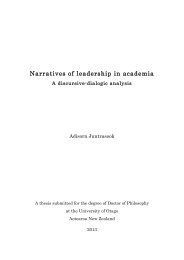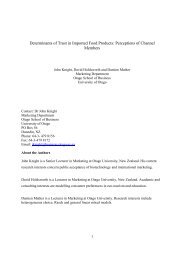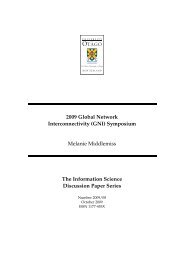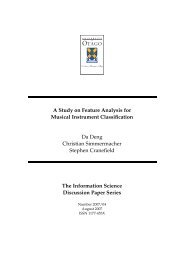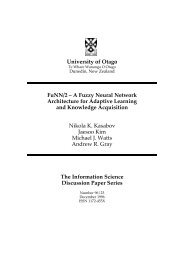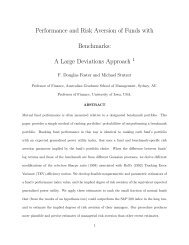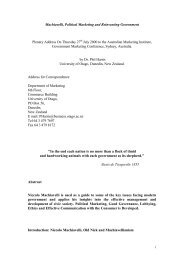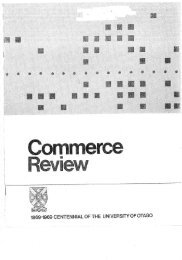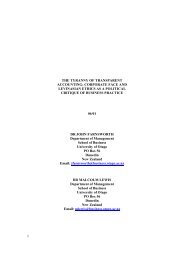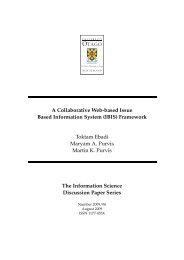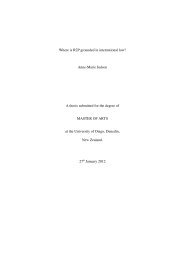University of Otago Cadastral - Otago University Research Archive
University of Otago Cadastral - Otago University Research Archive
University of Otago Cadastral - Otago University Research Archive
Create successful ePaper yourself
Turn your PDF publications into a flip-book with our unique Google optimized e-Paper software.
dispute reduction, scope for personal enterprise and soil conservation. These arguments<br />
focus on the micro-economic issues <strong>of</strong> efficiency. This economic efficiency <strong>of</strong> productivity<br />
has been achieved at a cost in terms <strong>of</strong> social equity,<br />
values.<br />
distribution <strong>of</strong> wealth and cultural<br />
4.5 Gender Issues<br />
The introduction <strong>of</strong> foreign land tenure systems also presents additional disadvantages for<br />
women who are already disadvantagedby the predominantpatriarchy in the world at large.<br />
Studies suggest that women produce about 60-80% <strong>of</strong> the food in Africa [UNECA l975},<br />
while men control the land on which the food is grown. This is true because c o n t r ohas<br />
l <br />
been defined in western terms. Though the w o m e n saccess to land was, and still is,<br />
principally by marriage, and would be described in westem terms as indirect rights, those<br />
rights were protected by the group ownership <strong>of</strong> the customary<br />
tenure. Depending<br />
on the<br />
cropping system,<br />
women did have controlling rights<br />
adopting western land tenure arrangements, these rights<br />
tenure systems<br />
are not equipped with the vocabulary<br />
How would one describe, in western land tenure language, the tights<br />
to some farmlots. However, by<br />
were lost because the western land<br />
to describe these i n d i r e crights.<br />
t <br />
<strong>of</strong> the senior wife in a<br />
polygamous household, to the various farmlots which she apportions<br />
to her co-wives for<br />
use on an annual or semi-permanent basis, or the powers <strong>of</strong> the<br />
umuokpu (the c o u n c i l <br />
married daughters <strong>of</strong> an extended family) to influence decisions, some <strong>of</strong> which may bear<br />
on land use, in the households <strong>of</strong> their b r o t h e r s ?<br />
<strong>of</strong><br />
Because <strong>of</strong> the predominant patriarchy in the whole world, the rights<br />
which men in<br />
traditional societies had in land were easier to translate into, and interpret in, westem terms<br />
and came to be recognised as the rights which existed in land, leaving<br />
the women out.<br />
Shipton [1988] found that the manner in which adjudication is conducted may also have<br />
work against<br />
women. In Luoland <strong>of</strong> Kenya, the refreshments given to the unpaid<br />
adjudication <strong>of</strong>ficers were prepared by women, leaving the men to discuss the existing<br />
rights in land without representation.<br />
5 What is Needed?<br />
What is needed has been hinted at by Dale H990, 7] when he recommended, after<br />
discussing the deficiencies <strong>of</strong> title registration, that [ t ] hkey e to evolution is to abandon<br />
17



